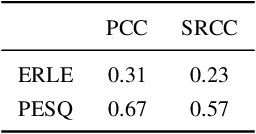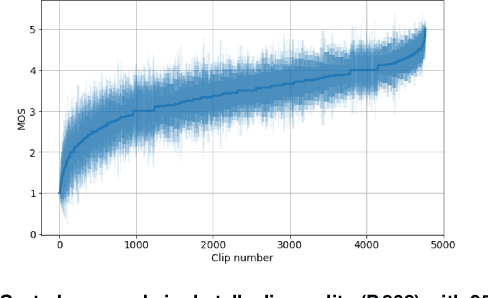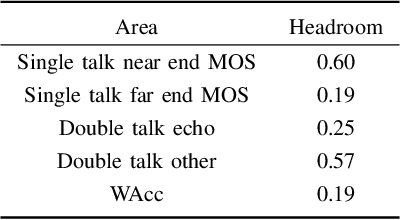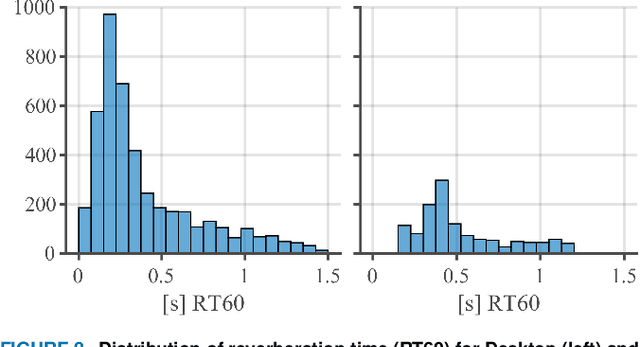Marju Purin
ICASSP 2023 Acoustic Echo Cancellation Challenge
Sep 22, 2023



Abstract:The ICASSP 2023 Acoustic Echo Cancellation Challenge is intended to stimulate research in acoustic echo cancellation (AEC), which is an important area of speech enhancement and is still a top issue in audio communication. This is the fourth AEC challenge and it is enhanced by adding a second track for personalized acoustic echo cancellation, reducing the algorithmic + buffering latency to 20ms, as well as including a full-band version of AECMOS. We open source two large datasets to train AEC models under both single talk and double talk scenarios. These datasets consist of recordings from more than 10,000 real audio devices and human speakers in real environments, as well as a synthetic dataset. We open source an online subjective test framework and provide an objective metric for researchers to quickly test their results. The winners of this challenge were selected based on the average mean opinion score (MOS) achieved across all scenarios and the word accuracy (WAcc) rate.
PLCMOS -- a data-driven non-intrusive metric for the evaluation of packet loss concealment algorithms
May 24, 2023Abstract:Speech quality assessment is a problem for every researcher working on models that produce or process speech. Human subjective ratings, the gold standard in speech quality assessment, are expensive and time-consuming to acquire in a quantity that is sufficient to get reliable data, while automated objective metrics show a low correlation with gold standard ratings. This paper presents PLCMOS, a non-intrusive data-driven tool for generating a robust, accurate estimate of the mean opinion score a human rater would assign an audio file that has been processed by being transmitted over a degraded packet-switched network with missing packets being healed by a packet loss concealment algorithm. Our new model shows a model-wise Pearson's correlation of ~0.97 and rank correlation of ~0.95 with human ratings, substantially above all other available intrusive and non-intrusive metrics. The model is released as an ONNX model for other researchers to use when building PLC systems.
ICASSP 2022 Acoustic Echo Cancellation Challenge
Feb 27, 2022



Abstract:The ICASSP 2022 Acoustic Echo Cancellation Challenge is intended to stimulate research in acoustic echo cancellation (AEC), which is an important area of speech enhancement and still a top issue in audio communication. This is the third AEC challenge and it is enhanced by including mobile scenarios, adding speech recognition rate in the challenge goal metrics, and making the default sample rate 48 kHz. In this challenge, we open source two large datasets to train AEC models under both single talk and double talk scenarios. These datasets consist of recordings from more than 10,000 real audio devices and human speakers in real environments, as well as a synthetic dataset. We also open source an online subjective test framework and provide an online objective metric service for researchers to quickly test their results. The winners of this challenge are selected based on the average Mean Opinion Score achieved across all different single talk and double talk scenarios, and the speech recognition word acceptance rate.
AECMOS: A speech quality assessment metric for echo impairment
Oct 08, 2021



Abstract:Traditionally, the quality of acoustic echo cancellers is evaluated using intrusive speech quality assessment measures such as ERLE \cite{g168} and PESQ \cite{p862}, or by carrying out subjective laboratory tests. Unfortunately, the former are not well correlated with human subjective measures, while the latter are time and resource consuming to carry out. We provide a new tool for speech quality assessment for echo impairment which can be used to evaluate the performance of acoustic echo cancellers. More precisely, we develop a neural network model to evaluate call quality degradations in two separate categories: echo and degradations from other sources. We show that our model is accurate as measured by correlation with human subjective quality ratings. Our tool can be used effectively to stack rank echo cancellation models. AECMOS is being made publicly available as an Azure service.
 Add to Chrome
Add to Chrome Add to Firefox
Add to Firefox Add to Edge
Add to Edge